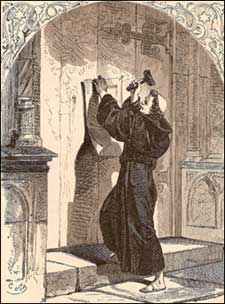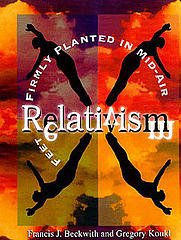
Almost 500 years ago Martin Luther nailed his 95 Theses to the church door in Wittenberg Germany. Luther's theses was a doctrinal challenge to the Roman Churches practice of selling indulgences (selling a pardon for sin). Luther did not intend to start a Reformation however, after questioning the practice of indulgences he found much more of the Catholic churches' practice and theology to be off base with scripture. Later Luther found himself before the emperor Charles the V being asked to recant of his beliefs under penalty of death, Luther before the diet of Worms said "My conscience is captive to the word of God, [...] I will not and cannot recant. Here I stand, God help me." For Luther and the Reformers (and the protestants to come) theology and doctrine were important enough to die for, because the gospel message was at stake.
In contrast, ours is a time where the ideals of humanism and pragmatic relativism are the dominant philosophies. If these are the major streams of thought in our culture it can be expected that these ideas will influence evangelicalism. Thus, pragmatism is very much vibrant today in church practices. The mentality follows thus: "Who cares about theology and analyzing the bible just tell me how to live (12 steps preferably) and make me feel good about myself." Thus pastors in modern emergent churches are taught to feed congregations with a steady dose of humor and quirky anecdotes, web pages are devoted to supplying pastors with jokes for Sunday service, with the aims of making people feel good.
The problem arises however when (if) the joking pastor turns to theological exposition. The people will turn him off thinking "Boring, I want to hear more about your fishing trip thank you very much." Or from the more pragmatic end one may think "Oh enough of this junk about justification just tell me how to keep a healthy marriage." I just want to say that these sort of attitudes are worldly, and are not to be catered to via books or topical sermon series as is the case. Now, of course desiring a healthy marriage is not necessarily a worldly attitude, but seeking a formula to accomplish that goal is standard pragmatism. Unfortunately, the very answers we seek to genuine problems we may have are not found in popular 12 step (Christian or non) books, but in the doctrines of the bible. But the question still flutters about the church "Is theology really important?"
I) Theology is Important Because the Bible is Important
Statements like: "For our sake he made him to be sin who knew no sin, so that in him we might become the righteousness of God. " (2 Cor 5:21) and "For the law of the Spirit of life has set you free in Christ Jesus from the law of sin and death." (Rom 8:2) are loaded with doctrine. One to even understand what is being said in 2 Cor 5:21 needs to know what "sin" is, to learn what "sin" is is to do theology. The theological concept of the "double imputation" is here also. Never mind the jargon what that means is that Christ takes our sin (imputed to Him) and takes the due penalty of it and He clothes us with His righteousness (imputes it to us) thus we have the reward of living a perfect life. My point is that every time we read the bible we are in the process of doing theology.
a) "I'm just not a theology kind of person"
The objection is often raised by Christians saying "I'm not really 'wired' to be a theology person, not my thing." Not my thing...Well I think if our "thing" is going to be living a holy life and treasuring Christ theology must be our "thing". Now I am not saying everyone needs to read beefy Systematic Theologies by dead white guys, what I am saying is that if we care about truth, if we care about holiness, if we care about glorifying God in our lives, theology is out of necessity going to be a part of that. Thus all Christians are theology people, as I pointed out above just to read and try to make sense out of the bible is to do theology, what on earth does it mean to be free from the "Law of sin and death."? What law is Paul talking about here? Mosaic or sinful nature? These are theological issues, and to be a student of God's word is to deal with these issues.
b) "I just don't think theology is really important"
This objection is raised often as well. I think in light of what was said above this is easily dismissed. To say theology isn't important is to say what the bible has to say isn't important. To say baptism, predestination, and the return of Christ aren't real important is to say that God inspired men to write words that are not important, because the bible deals with these issues.
c) "Doctrine divides!"
The popular Schliermacher phrase that "doctrine divides" is tossed around to shut down any theological discourse. It is a true statement but not necessarily bad. The doctrines Luther recovered divided the church, however, I say for the better. Justification by faith alone is a make or break doctrine (that we are saved by faith alone in what Christ did on the cross, nothing else), if you don't believe it I think it's really hard to be called a Christian. This is opposed to the bad doctrine of the Catholic Church at the time where eternal life was basically for sale, and salvation was by faith and works (penance). So yes doctrine does divide, it divides truth from error.
II) Theology/doctrine is practical
For our pragmatist friends I have no 12 steps, I do suggest one, be a student of the word. God truly has supplied us with all we need for life and godliness. In my own life I have found the theological truths to be so very practical. For instance:
a) Justification by faith alone
The sad thing is I really didn't understand justification by faith alone until I was a Christian for over 3 years. Of course I believed I was saved by faith but I always had to try and put up a "good Christian" image for others and defend myself when criticized. Upon realizing that I was justified by faith alone and my righteousness was not my own I found myself freed to be who I really was, a sinner. Now, don't jump to conclusions, what I mean by that is that I was free to be wrong, free to admit mistake, free to confess before others my sin all because at rock bottom my righteousness is in Christ alone.
b) So you want marriage applications?

This truth (justification by faith alone) and the doctrine depravity of man has been my best marriage counselor. When a quarrel may arise I realize it's ok to not defend myself. I can honestly step back and think "Ok how an I sinning here..." Now when Lisa and I get into spats they generally end with us both confessing sin and apologizing to each other. Rather than being a drawn out stalemate with each of us waiting for the other to flinch like two western gunslingers, we are free to admit our wrongs, this is because of the truths that we are sinful, and that our righteousness is not our own. The doctrine of justification by faith alone has without question been the most practical tool in my marriage, not any psychologized advice about boundaries, or being a "self esteem" builder. These are just law which I will fail to keep, but to have the freedom to admit wrong is the greatest help I have gotten in my marriage, and it came from the bible's teaching on justification. (Rom 4:5)
III) Theological Redwoods/ Closing Thoughts
I have really skimmed the surface here with the importance of theology, but I think it is clear that if we are going to care about what the bible has to say we will care about theology. Again I want to reaffirm I am not saying that everybody needs to be like me and read Systematic Theologies in their spare time, but I am saying that we are not to be cavalier in our thinking about theology. I don't think it would hurt to read the Puritans though :) ! When I read the Puritans a difference in quality is distinctly noticeable in comparison to what passes for Christian literature today. The Puritans were theological Redwood trees, they became such by immersing themselves in the bible. Today we have theological cattails giving quick fix answers to people by and large in therapeutic psychologized terms. We can be redwoods, not necessarily by reading dead white guys but by loving the bible and basking in its truth.
In the bible alone do we have the message that people in Uganda need to hear, even if it may cost our very lives. For, in the bible are the words of eternal life, through faith in Jesus Christ alone. God has inspired a book about Himself, man, and the way to eternal life are we not to give our all to understanding His words? Are not the words of Christ: "love the Lord your God [...] with all your mind." (Matt 22:37) fulfilled by a hearty life long devotion to studying his word?












